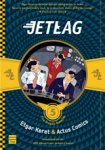Etgar Keret & Actus Comics, Jetlag
reviewed by anna battista

Israeli director, writer and screenplayer Etgar Keret has recently been working on a film called Meduzot which tells the story of three women living in Tel Aviv. The film title means “jellyfish,” and he must have thought about it because of the nature of his characters: like jellyfish, they don’t have any control over their lives, but let themselves be transported and carried away by the strange and surreal events that happen to them. This is perhaps a trademark of Keret’s characters, who always seem to find themselves in absurd situations, but they hardly oppose any resistance to them, deciding to live as best as they can in a dysfunctional reality.
Jetlag, a collection of five stories penned by Keret and illustrated by Actus Comics - a Tel Aviv-based group of artists who has won international acclaim as one of the most innovative independent artistic ventures currently operating - catapults the readers into a surreal and amazing world. The stories featured in this collection have previously appeared in Keret’s anthologies, but this is the first time they are published in comics form.
The collection opens with “HaTrick”, a story illustrated by Batia Kolton about a magician who loses control of his tricks and starts pulling out of his hat macabre relics rather than cute white bunnies; “Margolis”, with illustrations by Yirmi Pinkus, is about the friendship between a boy and his piggy bank; “Jetlag”, illustrated by Itzik Rennert, tells the vicissitudes of a nightmarish flight to nowhere and features a porn-obsessed dwarf dressed like a young girl and a horny air stewardess. The somewhat naïf illustrations of Mira Friedmann beautifully complement “Passage to Hell”, in which a young woman living in a small town in Uzbekistan, built near the entrance to Hell, falls in love with a very special visitor. The book closes with “The Romanian Circus”, illustrated by Rutu Modan, with, as main character, a salesman who falls in love with a circus acrobat.
The stories are short and told in a simple way, the drawings are at times disturbing, at others minimalist, but they always seem to fit the rhythm of the narration. Optimism transcends life in all the tales: even if the boy must separate from his piggy bank that he affectionately calls Margolis, he will still save it from his father’s hammer; the narrator of the flight story loses his horny stewardess, but he will save his life; the salesman, abandoned by the circus acrobat and left nursing her paralysed monkey, suddenly decides to play at being an acrobat himself, forgetting his worries. In the human laboratory of life, Keret’s specimens just try to get by and survive, while they are surrounded by a world that has simply gone crazy.
Keret, born in Israel in 1967, published in 1992 his first short story collection, Pipelines, that was followed by four graphic novels, a few screenplays and other volumes of short stories, among them the acclaimed The Nimrod Flip-Out (Random House), The Bus Driver Who Wanted to Be God (Toby Press) and, in collaboration with Samir el-Youssef, Gaza Blues (David Paul Books).
Hilarious and funny, but at the same time touching and moving, Jetlag should keep you busy while Keret puts his final touches to Meduzot. In the meantime, you can also check out Guran Dukic’s film Wristcutters: A Love Story, based on Keret’s novella Kneller's Happy Campers (starring Tom Waits as Kneller), which has recently been presented at the Sundance Festival.
Life can be depressing and confusing, but also bizarre and tragicomic: multitalented Etgar Keret knows this too well, and has magically found the antidotes to cope with it beautifully, surrealism and optimism.
Copyright (c) 2006 erasing clouds |
|